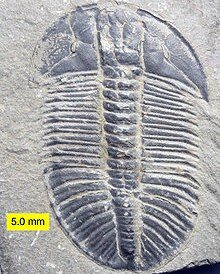Last week I was at the Smithsonian Museum of Natural History looking at trilobite fossils, at the same time a paper entitled “Discovery of some 400 million year-old sensory structures in the compound eyes of trilobites” was being published.
Trilobites are a well-known fossil group of extinct marine invertebrate animals having an external skeleton, a segmented body, and jointed appendages. They appeared during the Cambrian era, at a time when most animal phyla appeared.
Their eyes are well preserved and have long been studied – now scientists have been able to go further. What can we conclude?
The trilobite eye is the earliest known eye existing in the fossil record, yet it is extremely well designed. It is not a primitive eye in any way, but a highly advanced and highly effective eye, especially given the trilobites’ typical environment at the bottom of deep water that is normally close to being completely dark. Even though trilobites were the most prevalent animal in the Cambrian sea, no significant evidence of trilobite eye evolution exists in spite of an abundant fossil record dating back to the early Cambrian era.
The Genesis One Code correlates the creation of animals as related in Genesis precisely with the Cambrian era, 530 million year ago. Not only does the Bible help explain the sudden appearance of almost every animal phyla in a very short time but also the fact that, as we see in this example, they were complex right from the beginning.
Tags: cambrian explsion complex eye creation vs evolution early eyes eye evolution Trilobites

